ASER (The Annual Status of Education Report), UWEZO and Beekungo are household-based assessments that test students and out-of-school children on basic reading and math skills. The exams are individually administered to determine a child’s mastery of specific topics. The ASER, UWEZO and Beekungo family of assessments test similar skills and but are adapted to each country’s curriculum and so caution must be used when comparing results across countries as well as across languages and time.
ASER India was initially designed by Pratham in 2005 to test children and young adults aged 6-16 in rural districts only. The assessment was adapted for use in Pakistan in 2008, where the exam was initially administered in rural areas only but expanded to some urban districts starting in 2011. ASER India and Pakistan are both administered annually.
UWEZO, which means capability in Kiswahili, implemented an ASER-style assessment in Kenya starting in 2009 and in Tanzania and Uganda starting in 2010. UWEZO’s exams are representative at the national and district level in all three countries.
A similar assessment, Beekungo, was administered in Mali in 2012 and 2013 to children aged 6-14. In 2013 conflict limited data collection in affected areas, and data includes only indicators representative at the district level in southern regions of the country.
With the exception of UWEZO Uganda, all three reading assessments are administered in English or French as well as a local language.
In many of the assessments, the test taker begins by attempting to complete tasks associated with an intermediate benchmark, such as subtraction or reading connected text. If the child successfully demonstrates a grasp of this material, then harder tasks associated with a higher benchmark, such as multiplication or reading a grade level 2 text, are implemented. This process is repeated until the highest benchmark is achieved or a child is no longer able to show an understanding of the material being tested. On math assessments, it is common that the child must answer approximately 80% of the questions in each section correctly to pass a level, but users should EPDC’s catalog of test items or the assessment themselves for more information. On reading assessments, to reach the “paragraph level, a child is required to read a short story fluently (many assessments allow only three mistakes or fewer). If the student is unable to complete the initial task on math or reading assessments, easier questions, such as identifying letters or numbers, are asked until the student can be identified by a specific level, such as a “subtraction” or a “paragraph” child.
Tables below summarize how assessment levels align with indicators in the EPDC database. Leveled indicators extracted from microdata and reports can be found in the Other Research Documents section of the website and include Supplementary Data for ASER 2006-2012, Supplementary Data for UWEZO 2009-2011, and Supplementary Data for Beekungo 2013.
For more detailed information, users can also consult the comprehensive summary table that EPDC put together to compare levels across each country for each year and shows how they align with each EPDC indicator. For further details about test items, see EPDC’s catalog of sample test items from each assessment and the reports from each assessment’s website.
ASER Reading Local Language
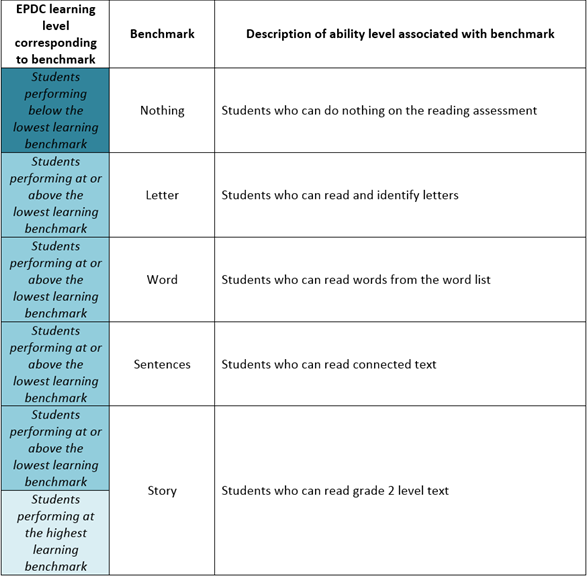
ASER Reading English
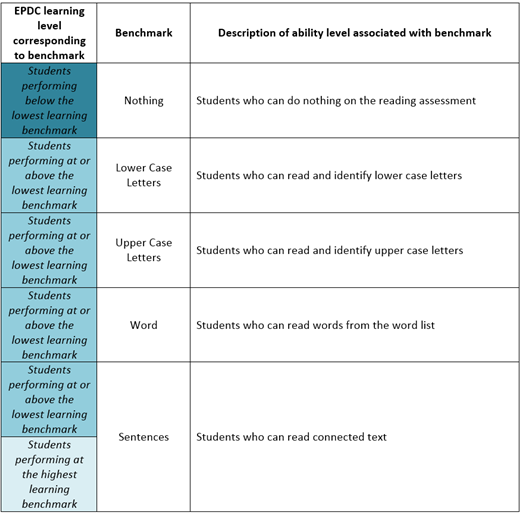
Notes on ASER reading assessments: the highest performance benchmark for the local language assessment is reading a grade 2 level story whereas the highest performance benchmark for the English assessment is reading connected text.
ASER Math
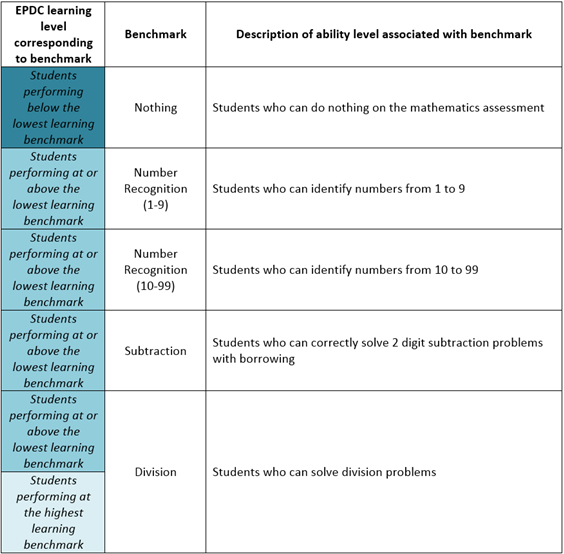
Notes on ASER mathematics assessments: In India from 2009-2012, recognition of numbers between 10-99 was not tested.
In both Pakistan and India, division problems were of the form 3 digit by 1 digit up until 2012. As of 2013, Pakistan has changed the division questions on their assessment to only include 2 digit by 1 digit problems.
UWEZO Reading English/Kiswahili
.png)
Notes on UWEZO reading assessment: Uganda does not offer the test in Kiswahili.
UWEZO Math (Uganda and Kenya)
Notes on UWEZO mathematics assessment: In 2011, an eighth level was added to the Kenyan assessment. Test takers were given a pair of numbers and had to identify which number was greater. This benchmark is referred to as “greater than” in reports and the EPDC supplementary dataset.
In 2011, Uganda included two additional sections which tested number recognition (100-999) and place value.
UWEZO Math (Tanzania)
Notes on UWEZO mathematics assessment: It should be noted that the highest performance benchmark on the Tanzanian assessment is multiplication which differs from the highest performance benchmark for Uganda and Kenya, division. In Tanzania, the subtraction and addition items are more advanced than in Uganda in Kenya.
Beekungo Reading French/Local Language
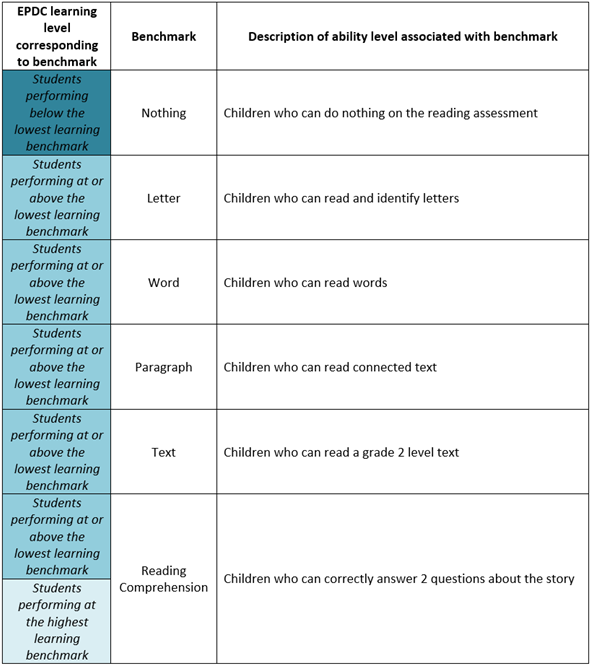
Notes on Beekungo reading assessment: Beekungo requires children to answer reading comprehension questions. UWEZO also offers comprehension questions on many of its exams, but these are structured as bonus questions rather than official exam levels.
Beekungo Math
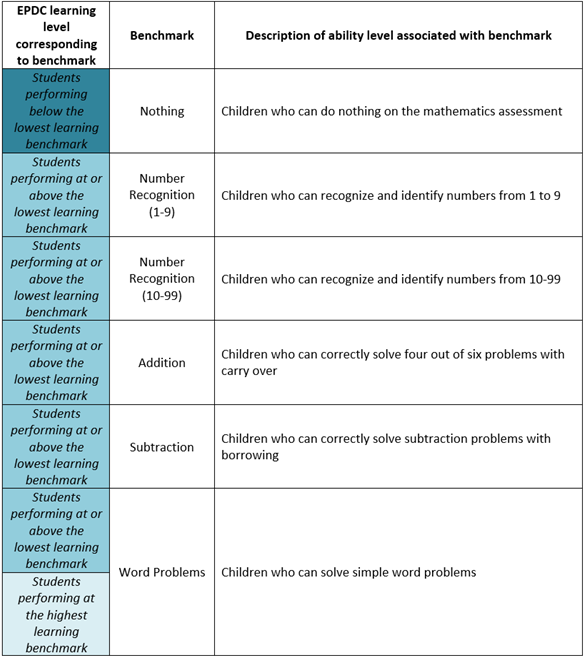
Blog originally posted at fhi 360 education policy and data center

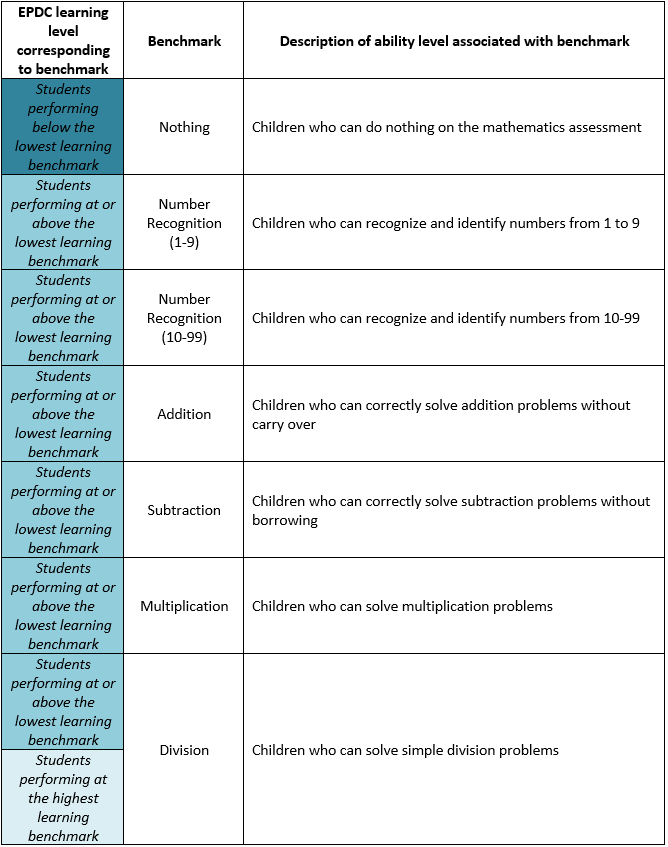
.PNG)